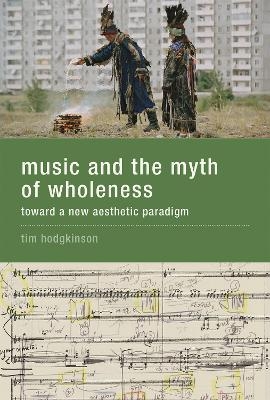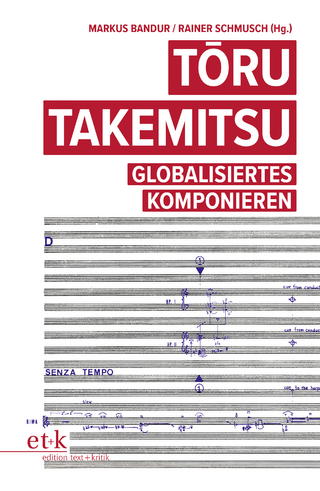
Music and the Myth of Wholeness
Toward a New Aesthetic Paradigm
Seiten
2016
MIT Press (Verlag)
978-0-262-03406-7 (ISBN)
MIT Press (Verlag)
978-0-262-03406-7 (ISBN)
- Titel ist leider vergriffen;
keine Neuauflage - Artikel merken
A new theory of aesthetics and music, grounded in the collision between language and the body.
In this book, Tim Hodgkinson proposes a theory of aesthetics and music grounded in the boundary between nature and culture within the human being. His analysis discards the conventional idea of the human being as an integrated whole in favor of a rich and complex field in which incompatible kinds of information-biological and cultural-collide. It is only when we acknowledge the clash of body and language within human identity that we can understand how art brings forth the special form of subjectivity potentially present in aesthetic experiences.
As a young musician, Hodgkinson realized that music was, in some mysterious way, "of itself"-not isolated from life, but not entirely continuous with it, either. Drawing on his experiences as a musician, composer, and anthropologist, Hodgkinson shows how when we listen to music a new subjectivity comes to life in ourselves. The normal mode of agency is suspended, and the subjectivity inscribed in the music comes toward us as a formative "other" to engage with. But this is not our reproduction of the composer's own subjectivation; when we perform our listening of the music, we are sharing the formative risks taken by its maker. To examine this in practice, Hodgkinson looks at the work of three composers who have each claimed to stimulate a new way of listening: Pierre Schaeffer, John Cage, and Helmut Lachenmann.
In this book, Tim Hodgkinson proposes a theory of aesthetics and music grounded in the boundary between nature and culture within the human being. His analysis discards the conventional idea of the human being as an integrated whole in favor of a rich and complex field in which incompatible kinds of information-biological and cultural-collide. It is only when we acknowledge the clash of body and language within human identity that we can understand how art brings forth the special form of subjectivity potentially present in aesthetic experiences.
As a young musician, Hodgkinson realized that music was, in some mysterious way, "of itself"-not isolated from life, but not entirely continuous with it, either. Drawing on his experiences as a musician, composer, and anthropologist, Hodgkinson shows how when we listen to music a new subjectivity comes to life in ourselves. The normal mode of agency is suspended, and the subjectivity inscribed in the music comes toward us as a formative "other" to engage with. But this is not our reproduction of the composer's own subjectivation; when we perform our listening of the music, we are sharing the formative risks taken by its maker. To examine this in practice, Hodgkinson looks at the work of three composers who have each claimed to stimulate a new way of listening: Pierre Schaeffer, John Cage, and Helmut Lachenmann.
Tim Hodgkinson is a composer, musician, and writer. In 1968, he cofounded (with Fred Frith) the politically and musically radical group Henry Cow. His compositions have been performed at concerts and festivals around the world.
| Erscheinungsdatum | 24.03.2016 |
|---|---|
| Reihe/Serie | Music and the Myth of Wholeness |
| Verlagsort | Cambridge, Mass. |
| Sprache | englisch |
| Maße | 152 x 229 mm |
| Themenwelt | Kunst / Musik / Theater ► Allgemeines / Lexika |
| Kunst / Musik / Theater ► Musik ► Musiktheorie / Musiklehre | |
| Geisteswissenschaften ► Philosophie | |
| ISBN-10 | 0-262-03406-9 / 0262034069 |
| ISBN-13 | 978-0-262-03406-7 / 9780262034067 |
| Zustand | Neuware |
| Informationen gemäß Produktsicherheitsverordnung (GPSR) | |
| Haben Sie eine Frage zum Produkt? |
Mehr entdecken
aus dem Bereich
aus dem Bereich
Grundbegriffe, Harmonik, Formen, Instrumente
Buch | Softcover (2021)
Philipp Reclam (Verlag)
7,80 €
globalisiertes Komponieren
Buch | Softcover (2023)
edition text + kritik (Verlag)
49,00 €


